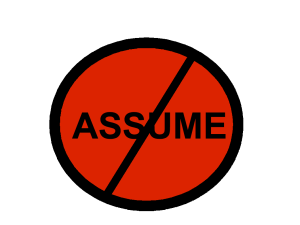 Perhaps you have heard the phrase, “Don’t assume, because it makes an ‘ass’ out of ‘u’ and ‘me.'” While it seems tongue and cheek, it’s very good advice. It’s amazing how we can understand this concept in theory, yet still make unwarranted assumptions at work. I think this happens mostly because we don’t even realize we have made an assumption. We just think “this is how it should be,” or we think we should know the answer. This is a mistake, and can be very detrimental to our career progression.
Perhaps you have heard the phrase, “Don’t assume, because it makes an ‘ass’ out of ‘u’ and ‘me.'” While it seems tongue and cheek, it’s very good advice. It’s amazing how we can understand this concept in theory, yet still make unwarranted assumptions at work. I think this happens mostly because we don’t even realize we have made an assumption. We just think “this is how it should be,” or we think we should know the answer. This is a mistake, and can be very detrimental to our career progression.
Here are a few examples:
Example 1: Assume that you know your responsibilities at work – Let’s say you are a project manager, and you have been in this role at several companies. You may think, “I know the job and what is expected of me, since I’ve been in this role before.” I would say that’s a mistake. Even if the role has the same name, it could mean different things for different companies. You may say, “Well, I know the primary goal for a project manager is to deliver on time and on budget.”
That’s true, but there are nuances that can make the role differ by company. Company A can make their project manager very task and time line oriented, and it is as is described above. On the other hand, Company B may expect their project manager to not only deliver on time and on budget, but that the project also delivers the business value it is set out to gain. If you didn’t know that, you could very well deliver a project on time and on budget, only to get a bad performance review because the project didn’t actually achieve the business objective.
Example 2: Assume that you know how well you are doing at work – Your perception of how good your work is may differ from your boss’s perception. This is why you can sometimes be surprised with a bad review. Since companies usually do only two review a year, it can take six months for you to find out that you are not on track in your career progression. This is the consequence of assuming that you know how your boss perceives your performance.
The easiest solution is to ask for feedback proactively, either every 3 months, after you complete a project, or reach a major milestone. This way, the feedback is informal and driven by you. If your boss has any concerns, he/she should share it when you ask, so you’ll get the chance to improve accordingly. Remember, perception is reality in the work place, and the boss’s perception of your performance is what will count towards your career progression at that company.
Example 3: Assume that you know your project member’s responsibilities on a shared project – Many times we have to work with other people to accomplish something at work. It is always important to clearly articulate and agree on each project member’s roles and responsibilities to ensure the success of the work together.
The worst thing you can do is assume, without confirmation, that someone else will do xyz. That person could have very well assumed that he is responsible for only x and y, and you are going to do task Z. Now task Z will fall through the cracks, and both of you will look bad if you discover this too late and miss a deadline. That’s one way that assuming can make an “ass” out of “u” and “me.” Don’t do it — communicate, communicate, communicate.
Example 4: Assume that your team members clearly understand their responsiblities – If you manage people, it makes sense to confirm that your team members understand your expectations clearly. I saw the best example of this in the book, One Minute Manager. In there, it says a manager was having trouble with two of his team members. They were working hard, but they always seemed to miss the mark a bit, and as a result, they were getting unhappy. This manager happens to see these two employees at a bowling alley. They were having a grand time as they saw themselves scoring every round.
It dawned on the manager that perhaps these two employees didn’t have a clear idea of their responsibilities at work. It was like they were bowling with a certain over the pins and no clear lanes. Of course they wouldn’t know where to roll the ball! Over time, if they kept rolling the ball blindly, they’d surely get frustrated when they don’t hit any pins. The next day, the manager sat each of them down and discussed more clearly what he expected from them, and how he measures their work.
There are probably many more examples of why assuming can be very counter productive to your career success. The point is to take a step back at your job and ask yourself, “am I making any big assumptions at work? If so, who can I communicate with to eliminate those assumptions?” Being able to discern when you are making an assumption is an important skill for supporting your career success. Best wishes!
Your comments: After reading this article, do you think you are assuming anything that you shouldn’t while at work? Add your comments below and let’s have a discussion.
Like this post? Help me out by sharing it on Linkedin, Email, Twitter, Facebook, Google+, etc.
– Lei